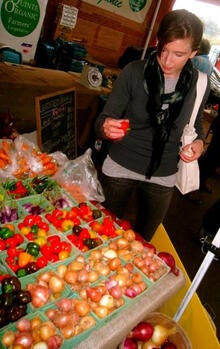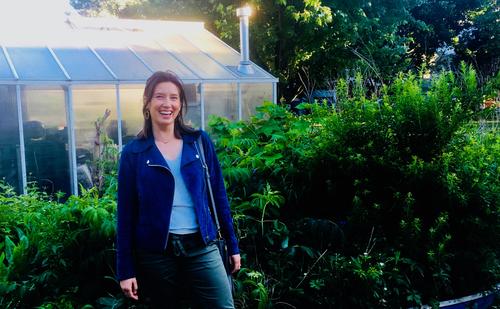
Environment PhD student named 2018 Pierre Elliott Trudeau Foundation scholar
Phoebe Stephens wins prestigious honour for research on investing for sustainable food systems.

Phoebe Stephens wins prestigious honour for research on investing for sustainable food systems.
By Sam Toman Faculty of EnvironmentPhoebe Stephens has been named one of Canada’s Pierre Elliott Trudeau Foundation scholars for her project investigating the need for sustainable food systems.
“Increasingly we are seeing food being treated as a financial product, vulnerable to stock market volatility. This is dangerous for something everyone needs to survive,” said Stephens. “On top of this, the financialization of the food system tends to favour an industrial model of production.”
 Stephens is as a PhD candidate in social and ecological sustainability in the School of Environment, Sustainability and Resources at the University of Waterloo. She is also a researcher for Sustain Ontario’s Food Enterprise Network, a member of the Waterloo Food Interest Group, and co-founder of Natural Interest, a consultancy geared towards supporting the growth of social finance in Ontario’s food sector.
Stephens is as a PhD candidate in social and ecological sustainability in the School of Environment, Sustainability and Resources at the University of Waterloo. She is also a researcher for Sustain Ontario’s Food Enterprise Network, a member of the Waterloo Food Interest Group, and co-founder of Natural Interest, a consultancy geared towards supporting the growth of social finance in Ontario’s food sector.
"Phoebe's work has the potential to not only transform the way we think about food, but also restructure the way in which sustainable food alternatives are made available to Canadians and the world,” said Jeff Casello, associate vice-president, Graduate Studies and Postdoctoral Affairs. “The impacts of her work, like so many graduate student researchers at Waterloo, are being recognized. The Pierre Elliott Trudeau Foundation scholarships are among the most sought-after and highly respected honours that can be received by emerging scholars, and we congratulate her and her supervisory team on this remarkable accomplishment."

“I am honoured to be given this amazing opportunity to study a topic of great importance by the Pierre Elliott Trudeau Foundation,” said Stephens. “Deepening our understanding of the viability of impact investing as a means of promoting food system sustainability will contribute to the advancement of knowledge necessary to build a more sustainable future for Canada. My research is poised to make both theoretical and practical contributions.”

Read more
Redefining capstone learning by bringing students, faculty and community partners together to tackle real-world challenges

Read more
Here are the people and events behind some of this year’s most compelling Waterloo stories

Read more
Researchers awarded funding to investigate ecology, climate change, repatriation, health and well-being through cultural and historical lens
The University of Waterloo acknowledges that much of our work takes place on the traditional territory of the Neutral, Anishinaabeg, and Haudenosaunee peoples. Our main campus is situated on the Haldimand Tract, the land granted to the Six Nations that includes six miles on each side of the Grand River. Our active work toward reconciliation takes place across our campuses through research, learning, teaching, and community building, and is co-ordinated within the Office of Indigenous Relations.